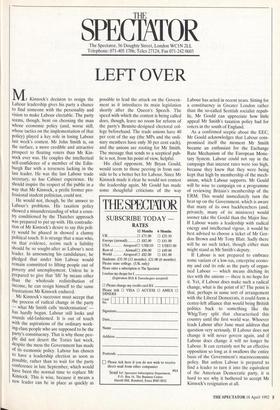THE
SPECTATOR
The Spectator, 56 Doughty Street, London Wel N 2LL Telephone: 071-405 1706; Telex 27124; Fax 071-242 0603
LEFT OVER
Mr Kinnock's decision to resign the Labour leadership gives his party a chance to find someone with the personality and vision to make Labour electable. The party seems, though, bent on choosing the man whose economic policy (and, worse still, whose tactics on the implementation of that policy) played a key role in losing Labour last week's contest. Mr John Smith is, on the surface, a more credible and attractive prospect to floating voters than Mr Kin- nock ever was. He couples the intellectual self-confidence of a member of the Edin- burgh Bar with a terseness lacking in the last leader. He was the last Labour trade secretary, so has Cabinet experience. He should inspire the respect of the public in a way that Mr Kinnock, a prolix former pro- fessional student politician, could not.
He would not, though, be the answer to Labour's problems. His taxation policy showed a misunderstanding of what a coun- try conditioned by the Thatcher approach was prepared to put up with. His contradic- tion of Mr Kinnock's desire to say this poli- cy would be phased in showed a clumsy political touch. It is strange that a man who, on that evidence, seems such a liability should be so sought-after as Labour's next leader. In announcing his candidature, he pledged that under him Labour would remain committed to lifting people out of poverty and unemployment. Unless he is prepared to give that 'lift' by means other than the wholesale redistribution of income, he can resign himself to the same frustrations Mr Kinnock endured.
Mr Kinnock's successor must accept that the process of radical change in the party — what Mr Smith calls 'modernisation' has hardly begun. Labour still looks and sounds old-fashioned. It is out of touch With the aspirations of the ordinary work- ing-class people who are supposed to be the party's constituency. That is why those peo- ple did not desert the Tories last week, despite the mess the Government has made of its economic policy. Labour has chosen to have a leadership election as soon as possible, rather than to wait for the party conference in late September, which would have been the normal time to replace Mr Kinnock. This is wise, because it means a new leader can be in place as quickly as possible to lead the attack on the Govern- ment as it introduces its main legislation shortly after the Queen's Speech. The speed with which the contest is being called does, though, leave no room for reform of the party's Bennite-designed electoral col- lege beforehand. The trade unions have 40 per cent of the say (the MPs and the ordi- nary members have only 30 per cent each), and the unions are rooting for Mr Smith. The message that sends to a sceptical pub- lic is not, from his point of view, helpful.
His chief opponent, Mr Bryan Gould, would seem to those peering in from out- side to be a better bet for Labour. Since Mr Kinnock made it clear he would not contest the leadership again, Mr Gould has made some thoughtful criticisms of the way Labour has acted in recent years. Sitting for a constituency in Greater London rather than the so-called Scottish socialist repub- lic, Mr Gould can appreciate how little appeal Mr Smith's taxation policy had for voters in the south of England.
As a confirmed sceptic about the EEC, Mr Gould acknowledges that Labour com- promised itself the moment Mr Smith became an enthusiast for the Exchange Rate Mechanism of the European Mone- tary System. Labour could not say in the campaign that interest rates were too high, because they knew that they were being kept that high by membership of the mech- anism, which Labour supports. Mr Gould will be wise to campaign on a programme of reviewing Britain's membership of the ERM. This would immediately turn the heat up on the Government, which is aware that many of its own backbenchers (and, privately, many of its ministers) would sooner take the Gould than the Major line. If Labour wants a leadership with radical energy and intellectual vigour, it would be best advised to choose a ticket of Mr Gor- don Brown and Mr Tony Blair. Sadly there will be no such ticket, though either man might stand as Mr Smith's deputy.
If Labour is not prepared to embrace some variant of a low-tax, enterprise econo- my and end its role as the party of organ- ised Labour — which means ditching its ties with the unions — there is no hope for it. Yet, if Labour does make such a radical change, what is the point of it? The point is that, perhaps in some sort of arrangement with the Liberal Democrats, it could form a centre-left alliance that would bring British politics back to something like the Whig/Tory split that characterised this country until the first world war. Whoever leads Labour after June must address that question very seriously. If Labour does not change it will never govern again, and if Labour does change it will no longer be Labour. It can certainly not be an effective opposition so long as it swallows the entire basis of the Government's macroeconomic policy. But unless Labour is prepared to find a leader to turn it into the equivalent of the American Democratic party, it is hard to see why it bothered to accept Mr Kinnock's resignation at all.


















































 Previous page
Previous page